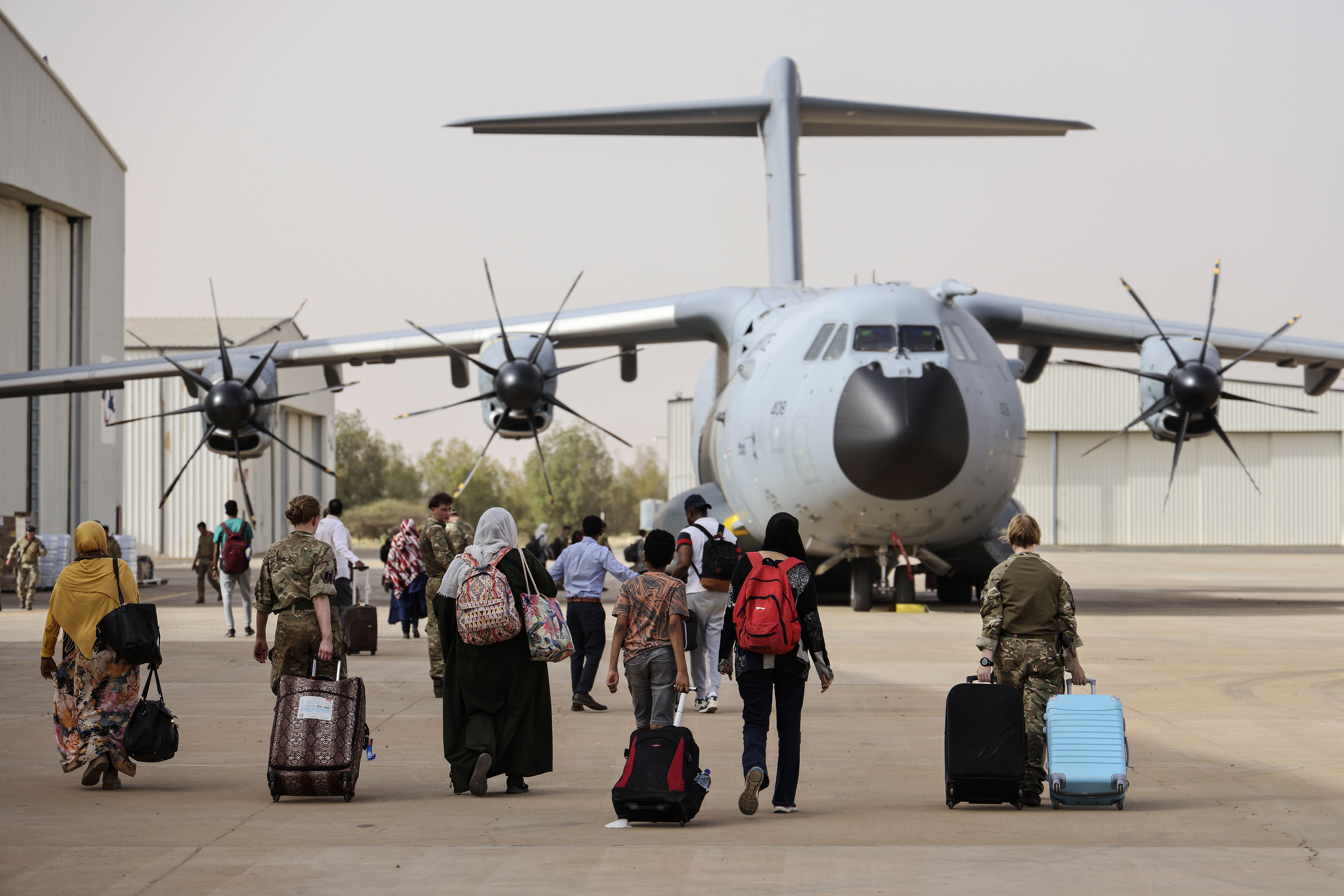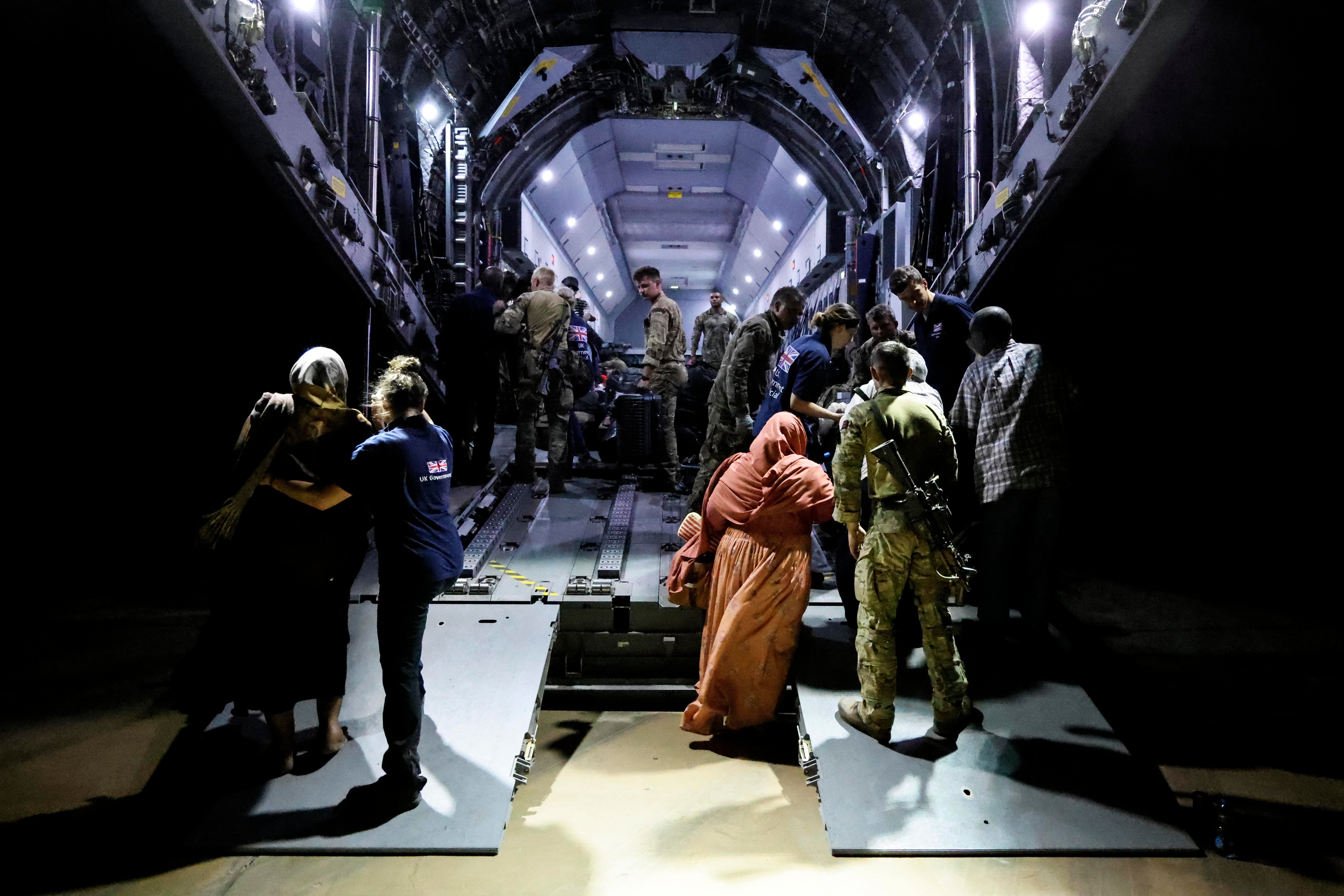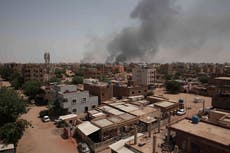Sudan evacuation rips British families apart as relatives left behind: ‘We had one chance and it’s gone’
‘My wife doesn’t even have access to her passport because it is with the British embassy’

Your support helps us to tell the story
From reproductive rights to climate change to Big Tech, The Independent is on the ground when the story is developing. Whether it's investigating the financials of Elon Musk's pro-Trump PAC or producing our latest documentary, 'The A Word', which shines a light on the American women fighting for reproductive rights, we know how important it is to parse out the facts from the messaging.
At such a critical moment in US history, we need reporters on the ground. Your donation allows us to keep sending journalists to speak to both sides of the story.
The Independent is trusted by Americans across the entire political spectrum. And unlike many other quality news outlets, we choose not to lock Americans out of our reporting and analysis with paywalls. We believe quality journalism should be available to everyone, paid for by those who can afford it.
Your support makes all the difference.British families are begging the government to reunite them with loved ones left behind in war-torn Sudan, after they were turned away from evacuation flights or faced trouble picking up travel documents.
Rishi Sunak has praised his government for the “successful” operation to “evacuate British nationals who wished to leave, their dependents and other nationalities from Sudan.” added that it was the “largest and longest evacuation of any Western country and one that those involved can be proud of”.
However British citizens and their MP say relatives are still stuck in the fighting and say repeated calls for them to be rescued have gone unanswered.
Mohamed, 27 a civil engineering student in Cardiff, said he now fears for the lives of his heavily pregnant Sudanese wife and unborn child, trapped and displaced in the capital Khartoum. Her family home was bombed at the start of the three-week conflict.
Manahil, 26, who is due to give birth next month, had been applying for a family reunion in the UK when fighting broke out between Sudan’s top two generals. She has yet to be granted an emergency visa to be with her husband, and cannot evacuate to neighbouring countries as her passport and documents are trapped in the British Embassy in Khartoum which is now empty, with staff having been evacuated.
“Her home was bombed by a fighter jet, she is sleeping on a sofa of a relative’s house, and I’m terrified as there are no functioning hospitals near her,” said Mohamed, who asked for his full name to be withheld for the safety of his wife on the ground.
“The explosions and gunfire are happening all around her. I’m scared she will go into labour early.” He said the government hotlines were not working and no one has answered his desperate calls.
“My wife doesn’t even have access to her passport because it is with the British embassy.
“Now the evacuation flights have ended she is crying every day. There is no way to get her out. There is no way to express how I feel”
Now the evacuation flights have ended... There is no way to express how I feel
Anna McMorrin, Mohamed’s MP in Cardiff and Labour’s shadow justice minister, said the situation was “desperate” for several of her constituents. She urged the government to immediately work with third-party countries to get family members out of danger so their papers can be processed and they can get to the UK.
“To leave a heavily-pregnant wife in the fighting is just horrific. This is an incredibly hostile response to people who are dependent on British families,” she told The Independent likening the UK’s response to failed efforts to airlift citizens from the Afghan capital Kabul after it fell to the Taliban in summer 2021.
“This happened in Afghanistan where we couldn’t repatriate people that were stuck and it is happening now in Sudan.
“We should be stepping up and showing leadership as a country,” she added.
A UK government spokesperson said: “The UK has carried out by far the longest and largest evacuation of any Western country from Sudan, bringing 2,341 people out in under one week. It has always been the case that the evacuation has been open to British nationals and their eligible family members, with a later exemption for NHS clinicians.
“Preventing a humanitarian emergency in Sudan is our focus right now. Alongside the UK evacuation effort, we are working with international partners and the United Nations to bring an end to fighting.”
More than 500 civilians have been killed, and hundreds of thousands of people displaced since fighting erupted in April between the commanders of Sudan’s army and a rival paramilitary the Rapid Support Forces, who had previously shared power.
Both sides have blamed each other for repeated violations of a series of ceasefire. Khartoum has faced intense fighting, including repeated volleys of artillery and airstrikes. Although South Sudan announced on Tuesday afternoon that the warring factions had agreed in principle to a seven-day ceasefire starting from Thursday.
The final UK government evacuation flights were thought to have left Sudan on Monday for Cyprus, but the government announced that people should make their way to the Coral hotel in Port Sudan by 10am local time (9am BST) on Wednesday for a last evacuation flight, adding that there would be no further British flights from the city.

But many will still not be able to make it to the evacuation point at Port Sudan in time for the deadline. It means those left in Sudan must now make their own way along the perilous road to Port Sudan or land borders with neighbouring countries.
Alaa, 29, a British teacher in Cardiff said her father Ahmed, 62 risked his life to get his daughter Sara and wife Nagla, to one evacuation point at a military airbase near Khartoum. When the family got there Sara, 23 and Nagla, 59 – both British passport holders – were permitted to board the escape flight but the father had to stay behind.
After camping at the airbase for a night, the pharmacist and father-of-five was forced to return to Khartoum alone through gunfire and shelling, where he is now trapped.
“He has no supplies because they had gave the food and water away before they left, thinking they wouldn’t come back,” said Alaa with desperation.
“Yesterday they bombed a factory right next to the family home, we are scared for him.”
She said the family was “desperate”.
“We’ve been told he has to go to Egypt and apply from there but that is a dangerous and long journey, he cannot do that at his age alone.”
“We had one chance, he was right there at the airport and now that chance is gone.”
“We had one chance, he was right there at the airport and now that chance is gone”
More than 100,000 people have been forced to flee the country via Egypt a border, which is hundreds of miles north of Khartoum.
Sudanese and foreign nationals who made the perilous journey described being shot at, shelled and robbed along the way.
At the border, they told The Independent there was no water or food supplies and the wait could be two or three days long.
Despite claims by the British authorities that dependents had been evacuated the reality on the ground is different, according to Ms McMorrin – who is set to raise the issue in parliament.
“You have British family members being split up, they are being so strict about having a British passport,” she said. “Even husbands and wives are not given automatic rights.”





Join our commenting forum
Join thought-provoking conversations, follow other Independent readers and see their replies
Comments